And it's not just a problem for newborns has ramifications for neurological function in adults too..
Mother Nature will continue to try her best to weed us out likely to no avail as we fight her off...
another joy of global warming (regardless the source) these tropical bugs now able to creep further north into the US
-----------
Zika Linked to Ever More Neurological Conditions
[COLOR=rgba(0, 0, 0, 0.65098)]
[/COLOR]
As the Zika virus has spread across the Americas these past few months, there has been more and more evidence that its greatest dangers are neurological. It’s been linked to the birth defect microcephaly, and the autoimmune nervous disorder Guillain-Barré pretty much from the beginning of the outbreak, but scientists are starting to see connections to other neurological conditions as well.
The outbreak has led to a rush on research to solidify these links, and in the cases of microcephaly and Guillain-Barré, the connection is finally strong enough to be called causal. In its
Zika situation report on Thursday, the World Health Organization used the word “cause” to describe the relationship between Zika and these two conditions.
“Based on a growing body of preliminary research, there is scientific consensus that Zika virus is a cause of microcephaly and Guillain-Barré syndrome,” the report reads.
But this confirmation is hardly the end of Zika’s neurological mysteries. There have been recent case reports of people exposed to the virus who’ve come down with different kinds of infections of the brain and spinal cord. In Guadeloupe, there was a case of
acute myelitis (an inflammation of the spinal cord) in a 15-year-old girl; there was a French case study of a man who came down with
meningoencephalitis (inflammation of the brain and its outer membranes); and new research out of Recife, Brazil, presented at the American Academy of Neurology annual meeting, has found two people who, after presenting with symptoms consistent with Zika or another flavivirus, came down with acute disseminated encephalomyelitis (ADEM). ADEM is a “brief but widespread attack of inflammation in the brain and spinal cord,” according to the
National Institutes of Health.
In the Recife sample, there were six patients who showed neurological symptoms (post-flavivirus symptoms)—the two ADEM cases, and four Guillain-Barré cases. Though both Guillain-Barré and ADEM are typically temporary conditions, in this study, five of the patients had “sustained motor dysfunction” after they were discharged, one had vision problems, and one had cognitive decline. ADEM, myelitis, and Guillain-Barré can all damage myelin, the protective sheath around nerve cells, which could lead to long-term consequences for nerve function.
All of this suggests that the Zika virus may target nerve cells in particular. (A
previous study also found that Zika proliferates in neural stem cells, which may be how it causes microcephaly.) That may be why all these neurological conditions are occurring in association with Zika. But it’s not clear whether these kind of complications were always a feature of Zika, or if they’re new,
Reuters reports:
Scientists are of two minds about why these new maladies have come into view. The first is that, as the virus is spreading through such large populations, it is revealing aspects of Zika that went unnoticed in earlier outbreaks in remote and sparsely populated areas. The second is that the newly detected disorders are more evidence that the virus has evolved.
The latest findings are significant for another reason, too. Much of the focus on the Zika virus has been the extent to which Zika can harm or kill fetuses. Ongoing research shows that while the illness is often mild in older children and adults, it can be serious for them, too.
As always with emerging outbreaks such as this, as some questions are answered, more are raised. But it’s become clear that, as Raad Shakir, president of the World Federation of Neurology,
wrote in The Lancet, “Neurological expertise is … crucial to deal with potential Zika sequelae.” Unfortunately, though, he notes that “in many economically deprived areas hit hardest by these disorders, there is a shortage of neurologists.”







